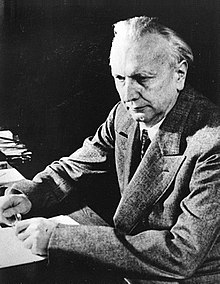
Back Karl Jaspers Afrikaans كارل ياسبرس Arabic كارل ياسبرس ARZ Karl Jaspers AST Karl Yaspers Azerbaijani Karl Jaspers BCL Карл Тэадор Ясперс Byelorussian Карл Тэадор Яспэрс BE-X-OLD Карл Ясперс Bulgarian Karl Jaspers BS
Karl Jaspers | |
|---|---|
 Jaspers in 1946 | |
| Born | Karl Theodor Jaspers 23 February 1883 |
| Died | 26 February 1969 (aged 86) Basel, Switzerland |
| Education | University of Heidelberg (MD, 1908) |
| Spouse |
Gertrud Mayer (m. 1910) |
| Era | 20th-century philosophy |
| Region | Western philosophy |
| School | Neo-Kantianism (early)[1] Existentialism (late) Existential phenomenology[2] (late) |
Main interests | Psychiatry, theology, philosophy of history |
Notable ideas | Axial Age; coining the term Existenzphilosophie; Dasein and Existenz as the two states of being, subject–object split (Subjekt-Objekt-Spaltung); theory of communicative transcendence, limit situation[1] |
Karl Theodor Jaspers (/ˈjæspərz/, German: [kaʁl ˈjaspɐs] ;[4][5] 23 February 1883 – 26 February 1969) was a German-Swiss psychiatrist and philosopher who had a strong influence on modern theology, psychiatry, and philosophy. His 1913 work General Psychopathology influenced many later diagnostic criteria, and argued for a distinction between "primary" and "secondary" delusions.
After being trained in and practising psychiatry, Jaspers turned to philosophical inquiry and attempted to discover an innovative philosophical system. He was often viewed as a major exponent of existentialism in Germany, though he did not accept the label.
- ^ a b Cite error: The named reference
SEPwas invoked but never defined (see the help page). - ^ Ernesto Spinelli (2007). Practising Existential Psychotherapy: The Relational World, Sage, p. 52: "Karl Jaspers can be considered to be among the earliest direct attempts to apply existential phenomenology to psychotherapy".
- ^ Gertrud Jaspers (Mayer) Geni
- ^ "Duden | Karl | Rechtschreibung, Bedeutung, Definition". Duden (in German). Retrieved 22 October 2018.
Kạrl
- ^ "Duden | Jaspers | Rechtschreibung, Bedeutung, Definition". Duden (in German). Archived from the original on 22 October 2018. Retrieved 22 October 2018.
Jạspers
© MMXXIII Rich X Search. We shall prevail. All rights reserved. Rich X Search